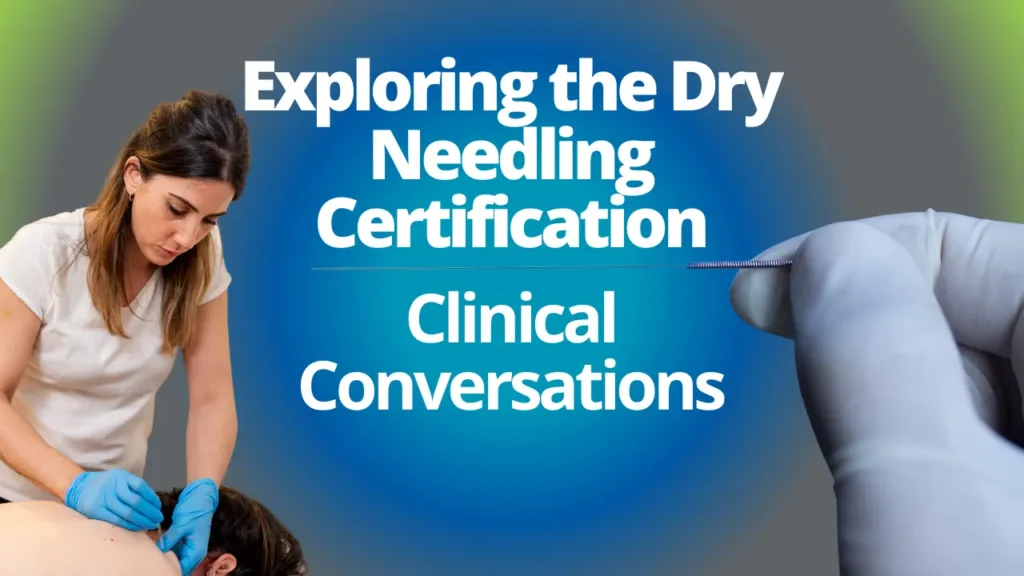
Dry needling is a transformative certification for physical therapists (PTs) aiming to boost treatment efficacy and patient satisfaction. Additionally, it empowers PTs to alleviate pain and enhance muscle function more effectively.
This article leverages insights from a Clinical Conversations episode featuring Dr. Ken Cooper of Master Dry Needling and Ashley Langford, PT, DPT of the CORA Institute for Clinical Excellence.
Introduction to Dry Needling
Dry needling targets myofascial trigger points to relieve pain and improve muscle function.
Consequently, this method acts as a non-pharmacological alternative to pain management, diminishing reliance on opioids. The technique’s effectiveness as a pain relief option fuels growing patient interest.
“The demand for dry needling has grown significantly as patients look for effective pain relief options beyond traditional pharmaceuticals.”
Dr. Ken Cooper, DC, PT, DAAPM, MDNC
Lead Instructor, Master Dry Needling
Determining the Right Time for Certification
Deciding when to pursue a dry needling certification depends on factors such as the therapist’s career stage, regulatory requirements, and readiness for advanced practice.
Early Career Certification Benefits
For new graduates, acquiring a dry needling certification offers a competitive edge. Importantly, beginning early with training, aligned with state regulations, enables therapists to broaden their clinical capabilities.
“Acquiring skills early in your career, provided state regulations are met, equips therapists to broaden their treatment scope.”
Dr. Ken Cooper, DC, PT, DAAPM, MDNC
Lead Instructor, Master Dry Needling
New PTs benefit from their recent in-depth anatomy studies, which are crucial for understanding the responsibilities associated with invasive procedures.
Mid-Career Dry Needling Certification Advantages
Seasoned physical therapists can revitalize their practice and tackle complex patient issues more effectively with dry needling certification. This certification acts as a potent tool for managing conditions unresponsive to other treatments.
“Dry needling can resolve cases where other therapies have failed, providing clinicians with an advanced tool to treat resistant conditions.”
Ashley Langford, PT, DPT, FAAOMPT, Cert. DN, AIB-VR
Director of Clinical Excellence, CORA Institute for Clinical Excellence
The Certification Process
The certification typically involves a comprehensive three-day course that focuses on crucial anatomy and safe needling techniques. Therefore, this training ensures that PTs grasp the necessary safety measures and anatomical considerations for effective practice.
“Our [Master Dry Needling] training programs are designed to instill a deep understanding of the necessary safety measures and anatomical considerations.”
Dr. Ken Cooper, DC, PT, DAAPM, MDNC
Lead Instructor, Master Dry Needling
Legal and Regulatory Considerations
It is essential for therapists to adhere to state-specific regulations governing dry needling. Following these guidelines ensures professional integrity and compliance.
“It’s crucial for practitioners to adhere to state guidelines to ensure compliance and maintain professional integrity.”
Ashley Langford, PT, DPT, FAAOMPT, Cert. DN, AIB-VR
Director of Clinical Excellence, CORA Institute for Clinical Excellence
The Impact of a Dry Needling Certification on Career Trajectory
Earning a certification in dry needling significantly enhances a physical therapist’s career by enlarging their patient base and boosting referrals. Specializing in dry needling often leads to increased patient referrals due to the clinician’s enhanced skills and outcomes.
“Therapists with this certification often see a growth in their patient base due to the specialized nature of their skills.”
Dr. Ken Cooper, DC, PT, DAAPM, MDNC
Lead Instructor, Master Dry Needling
Dry Needling Education and Advanced Certification
Further education in dry needling extends a PT’s treatment capabilities, allowing them to apply more complex techniques and address a broader range of clinical scenarios. Continuing education and advanced training are encouraged to refine skills and expand treatment options.
Evaluating the Best Time to pursue a Dry Needling Certification
Physical therapists considering dry needling certification should carefully evaluate their skills, career goals, and the regulatory environment. Committing to ongoing education and adhering strictly to safety protocols are crucial for effectively leveraging this treatment technique.